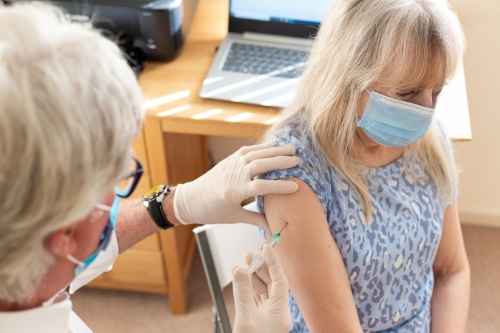

I’m at my one year anniversary of getting Pfizer’s COVID-19 vax. I’m starting to worry less about adverse effects, not that I ever lost much sleep over it. Fortunately, I’m hearing no chatter at my hospital about requiring the boosters. Yet I don’t hear any of the vax mandators saying “we were wrong.” A relative of mine is searching for a job now and reports that the great majority of posted jobs still require the vax. Unbelievable!

Many people assumed the vaccine kills you quickly (in the first two weeks) because that’s when people notice the association and report it to VAERS [Vaccine Adverse Event Reporting System in the U.S.]. This is still true; it does kill some people quickly: half of the deaths reported in VAERS are in the first few weeks.
But the key words are “reported in VAERS.” It turns out that if we don’t have that restriction but are just wondering when most of the deaths after COVID vaccination happen, the answer is different.
Thanks to a helper [whistleblower] who works at HHS [Health and Human Services in the U.S.], we can now clearly see that most of the deaths from the vaccine are happening an average of 5 months from the last dose. That is for the second dose; it may be getting shorter the more shots you get but there are arguments both ways (since there can be survivor bias). Using data from the UK, we can see more clearly that the delay time is around 23 weeks (so a bit more than 5 weeks). We’ll dive into that shortly.
This delay explains why the life insurance companies got off-the-charts all-cause mortality peaks for people under 60 in Q3 and Q4 [3rd and 4th quarters of 2021] rather than right after the shots rolled out.
The five month delay is also consistent with death reports where people are developing new aggressive cancers that are killing them over a 4 to 6 month period.
The 5 month death delay was also confirmed using only European data. That analysis was posted Aug 11, but I learned about it after I wrote this post.
So when you hear of a death from stroke, cardiac arrest, heart attack, cancer, and suicide that is happening around 5 months after vaccination, it could very well be a vaccine-related death.
Kirsch concludes that:
The UK data shows statistical proof of causality of deaths (p<.001): the vaccine doses track with the excess deaths 23 weeks later. Dose dependency is key to showing causality. If no one can explain this, the precautionary principle of medicine requires any ethical society to halt the vaccines now.

In what is possibly related news, guess what’s the top killer in Alberta, Canada, at this time. “Ill-defined and unknown causes.” I’d expect that out of an undeveloped, third-world country, but not Canada. Are they trying to hide something?
For your consideration, Safe and Effective: A Second Opinion (I haven’t viewed it):
Steve Parker, M.D.








